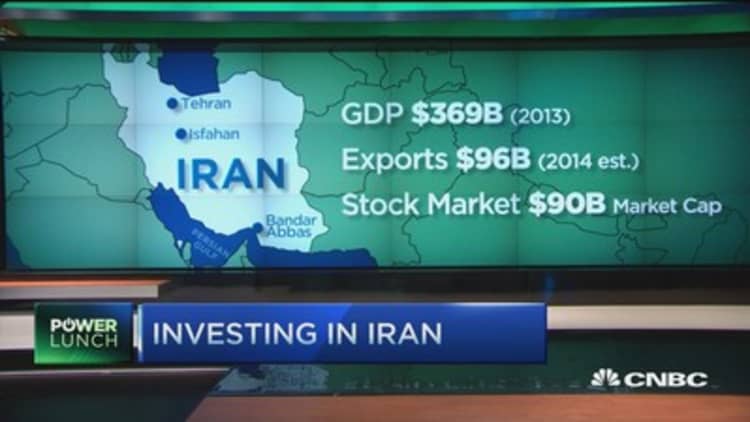
Every day seems to bring another round of tumbling global stock markets, but at least one country's shares are jumping.
Iran's stock market is having a big week, up 5 percent — despite plunging oil prices — after international economic sanctions against the country were lifted over the weekend.
The Tehran Stock Exchange is still down almost 40 percent from its peak in January 2014, but now that sanctions related to Iran's nuclear program have evaporated, market-watchers inside the Islamic Republic are seeing the money pour back in.
CEO Ramin Rabii of Turquoise Partners, one of Iran's largest brokerage firms, described the mood among investors as "euphoric."
"Stocks picked up this week, clearly in anticipation of money from outside the country flowing into stocks," he said. Turquoise Partners actively manages 90 percent of all foreign money that flows into Iran's stock market. Most of that money comes from Europe and the Middle East.
The fund is focused mainly on Iran's commodity sector and consumer stocks. "Because commodities are out of favor right now, we are concentrating on the potential of the Iranian consumer," said Rabii, who makes investing decisions for Turquoise.
The firm has holdings in Iran's pharmaceutical and telecom sectors. Turquoise is also keeping an eye on Iranian banks and financial stocks as banking sanctions melt away.
Rabii said he's surprised by the media attention that is often so concentrated around Iran's oil sector. While the low price of oil is certainly hurting the country's economy, it has less of a effect on the Tehran Stock Exchange. Because the state owns many of the oil companies, they are not listed on the exchange.
However, with oil trading at multiyear lows in the high $20s per barrel, much of the world's attention in financial markets is indeed focused on Iran's energy industry. If Iran floods world oil markets with more crude oil, those already low oil prices are very likely to drop further.
The chief working theory in the oil market now is that Iran will soon start producing 3.3 million barrels per day — 500,000 more than the 2.8 million barrels the country currently produces, most of which goes to buyers in Asia.
Rand Corp. senior economist Keith Crane said he agrees that Iran is capable of quickly putting another 500,000 barrels into the market but believes the country needs substantial Western financial and technological investment to do much more than that.
Either way, he said, oil will have only a marginal impact on Iran's economy and stock market. "Ending sanctions promises to ease impediments to importing products and collaborating with Western partners," he said. "That opens opportunities for increased profits."
Though nuclear sanctions against Iran are easing, the United States still has other sanctions in full force against Iran for human rights abuses, ballistic missile production and the country's support for terrorism. So while Rabii says "the Iranian stock market is cheap, valuations are great," American investors still will not be able to put money into Iran as they can in other emerging markets.


